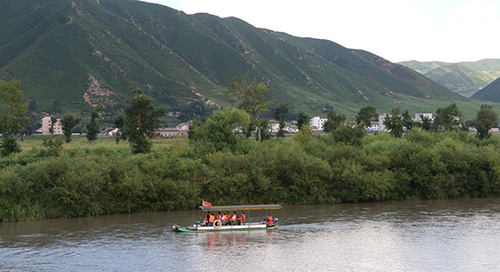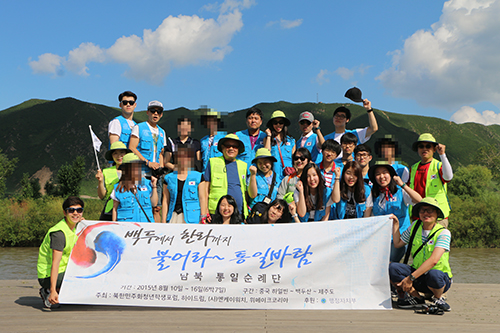 North Korea from China’s side of the Tumen River. Image: Daily NK |
Unlike River Lethe in Greek mythology, the
Tumen River, which acts as a border between North Korea and China, does not
swallow up past memories for young North Korean defectors. Lethe was said to
provide forgetfulness for those who crossed the river, allowing them to move
beyond their past pains and enter a new life. The Tumen, contrary to this,
conjures up some of the most painful and fearful moments for defectors, as many
recall crossing its icy cold water with their lives on the edge to escape their
homeland.
Beyond Tumen, a drink from a kind stranger on the other side
Heo Seo Yeong, who took part in the recent unification ‘pilgrimage’, still has fresh memories of the one drink she
was offered by a Chinese man after she crossed the Tumen River. Now 22, Heo
remembers being served a shot of Kaoliang (a strong distilled liquor) by the
Chinese man who aided her in her escape in 2011.
“Security was tight at the time around the
borders and the Tumen, so I crossed thinking that I would die on the spot if I
was caught,” Heo said.
She recalled the water that enveloped her
body at night, being so different from the Tumen she had encountered while
scouting out the area during the day. “That short span of time that it took to
cross felt like forever,” she recalled.
The first thing Heo ran into after crossing
was a barbed wire fence (sealing off the Chinese border) and a following sense
of defeat she felt in that moment. “I guess I’m done here,” Heo remembered
thinking.
Luckily, her Chinese supporter found her
and took her to an undisclosed location. “You’ve been through a lot. Everything
is okay now,” he told her while offering her a drink. “Now, looking back on it,
I realize it was out of consideration for my body that had been in cold water
for a long time with the utmost tension,” she said. “Once the strong liquor
passed through, I could feel my body getting warmer and my thoughts clearer.”
 Members of the group looking at North Korea from a boat. Image: Daily NK |
Young defectors need help in trauma
treatment
Many young defectors that were on the
‘pilgrimage’ spoke of being psychologically scarred, or suffering from PTSD,
after having crossed the line of life or death. The emotional toll and
psychological impact still remain deeply embedded.
They say the fear that they lived with was
much greater in China. What terrified many of them on the trip was going back
to that country after having lived there under the constant threat of
repatriation.
 Truck crossing over into North Korea after going through customs in China. Image: Daily NK |
“I hesitated a lot about this trip,” Kim
Kyeong Ok (23) said. “I lived in hiding for about three months in China
after I escaped, and I will never be able to forget that sense of unease that I
lived with,” she explained.
The story is not much different for Choi Mi
Jin (22). “I still have dreams about it. The memories of living in hiding are
still so fresh,” she said. “It was a difficult decision, but even if it’s like
this, I wanted to get a look of my homeland, so that’s why I’m here.”
This debilitating fear that many lived with
continues on during their resettlement in the South.
“The scariest thing in China was the
police,” one student recalled. “You may not be able to understand it, but even
after I came here, I would run away from the police without even thinking. I’ve
even hidden under a car.”
“Now, things are a lot better, but I do
tend to avoid the police even though I haven’t done anything wrong,” he said.
 Members pose for a photo on the banks of Tumen River against the backdrop of North Korea. Image: Daily NK |

















